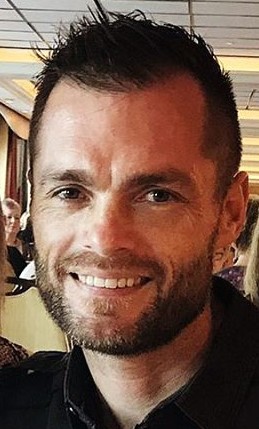This post is part of a blog series on racial justice where writers reflect on what it means to do anti-racism work in their context.
 Eric Potter has been serving as the pastor at Metamora Mennonite Church in central Illinois for the past 3.5 years. As a CCDA (Christian Community Development) practitioner, trained spiritual director and Enneagram enthusiast, his ministry swims in the stream of contemplative activism. He is married to Miley and has the best three kids in the world, Avery, Hudson and Saige.
Eric Potter has been serving as the pastor at Metamora Mennonite Church in central Illinois for the past 3.5 years. As a CCDA (Christian Community Development) practitioner, trained spiritual director and Enneagram enthusiast, his ministry swims in the stream of contemplative activism. He is married to Miley and has the best three kids in the world, Avery, Hudson and Saige.
_______________
Growing up as a young boy in rural Iowa on long car-rides, my twin brother and I often asked that question, “Are we there yet?” Mom would usually respond with, “Every time the wheels turn we are a little bit closer.”
When it comes to the issue of race in America, when I listen closely, I hear many of my white brothers and sisters asking, “Are we there yet?” The answer is a resounding no! Sure, every time the wheels of history turn, we are a little closer, but in light of the recent incidents of unarmed people of color dying at the hands of those in power, it only reveals that the long journey is still ahead.
Beginning with the ending of slavery of one form in the Emancipation Proclamation in January 1863, to the adoption of the 13th Amendment that abolished slavery except as a punishiment to crime, to the 14th Amendment that gave citizenship to former slaves, and again with the 15th Amendment that granted the right to vote to Black men, the wheels began turning on this long road. However, slavery sadly took on another form in the Jim Crow south, which led to the birth of the Civil Rights movement due to the lingering racism and discrimination in America. Are we there yet? No!
What has been part of the Black experience for years is now being revealed to all people. Through movements like Black Lives Matter, we have seen a more conscientious response by many with the removal of confederate statues, the changing of a state flag, a rebranding of Aunt Jemima, and the Dixie Chicks now just being called The Chicks. Now all these steps are a simple rotation of the tire, but they are merely nice gestures along the way and are not the goal. For followers of Jesus, the destination of this long journey is reconciliation, and reconciliation is only possible if those who are divided are present to one another in an ongoing, relational way.
For years and years the white church has been silent in the fight against racial injustice. We cannot, must not, continue on the same path that got us here if we are to see any real change.
An Anglican pastor friend of mind, Greg, called me up about a week after George Floyd’s death and said we have got to do something. Agreed. We do. But what? This “what” question is echoing in many predominantly white churches here in central Illinois, home of the third most segregated city in America. The reason we are asking “what” is a result of years and years of silence, apathy, and turning the other way when race and racial tension enter the public discourse. The white church has much to do in the realm of anti-racism.
The Spirit has led Greg and I to call together 12 small to midsized predominantly white churches to action. Before we get to the “what” to do, we need desperately to lament of what has been our path to this date: the path of silence, apathy and ignorance. First we are calling these 12 churches together for a day of prayer and fasting. We will be praying the hours — 7 a.m., 9 a.m., noon, 3 p.m., 6 p.m., 9 p.m. and at the top of each hour we will come together virtually and a portion of our prayer liturgy will include one of six Black pastors in our area sharing their story of growing up Black in America. They will also bring a specific hope they have for this present season, as well as an encouragement towards ways we (the white church) can take another step in this long journey towards reconciliation.
This time of lament through prayer and fasting is great; however, it is the action piece that excites me the most. One month after our prayer and fasting, each church will then respond back to one another and the Black pastors and share what they sense the Spirit is leading each to do in response to this issue of race in America.
One reason we are inviting small to midsized churches is we feel they are better equipped to respond in ways that are meaningful. We are a midsized church and over the past 3.5 years Metamora Mennonite Church has intentionally pursued relationship with a predominantly black church, Zion Baptist. We have been together in worship four different times, each followed by a fellowship meal. We have served together, studied scripture together, and listened and learned together. The spring of 2020 was to be a season of shared meals together in groups of eight; however, this is on pause by the pandemic, unfortunately. We aren’t there yet, but with every intentional turn of the wheels we can reach our destination with God’s help.
“All this is from God, who reconciled us to himself through Christ and gave us the ministry of reconciliation.” 2 Corinthians. 5:18
May the Lord bring creative imagination to you and your church, as you discern your next steps towards reconciliation.


